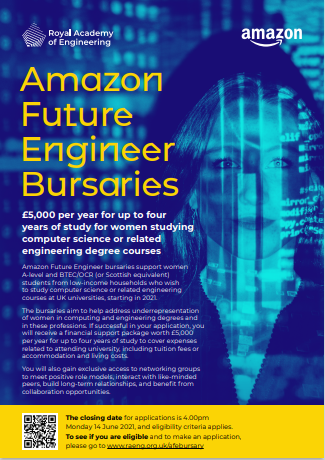Heart of Midlothian FC Digital Innovation Centre – Create an App to Save the World
Innovation in Sport
A football stadium may seem an unlikely place to learn about technology, robotics, and software programming, but for a growing number of children and young people across Edinburgh, it’s a valuable new addition to their community. Heart of Midlothian Football Club, (or Hearts, ‘Herts’ or ‘Jam Tarts’ if you prefer), has an unusual addition to the usual sporting facilities – an Innovation Centre. Founded in 2019, the Heart of Midlothian FC Innovation Centre, is sponsored by Baillie Gifford and powered by Dell Technologies. The centre provides hardware, software and equipment to the local community. It also runs a range of courses to help people across the city to learn new digital skills, or find a career in technology.
The presence of the Innovation Centre becomes a little less surprising when you discover that Ann Budge, the owner of the club, is a technology entrepreneur and business leader, with a passion for supporting new talent. The link with the club also helps attract young people who may not otherwise engage with digital technology through school or at home.
Football First
The fact that many young people are first and foremost football fans, enables the Innovation Centre to find new ways to build upon that passion. Tanya Howden, the Digital Education Programme Manager for the Innovation Centre, says that the club’s use of technology provides a way for children and young people to think about the technology in their lives.
“There’s a growing range of technology used within football clubs. From goal-line technology to fitness trackers, we can show children from primary school age upwards, the ways in which a player’s location, speed and fitness levels are captured and measured, in a way which is meaningful to them. We can then work with them to build prototypes for their own trackers and teach them the design and development skills to understand all the other ways in which technology is present in their lives. This really helps show them that technology is not scary, that it’s not ‘just for boys’, and that you don’t need to be a maths genius to make things work.”
Innovation Centre
The Innovation Centre is located within the media suite, where journalists are based on match days. This provides a large and exciting space, which has been designed to support people taking part in the classes and courses. The centre works with a number of Edinburgh’s leading businesses, including Baillie Gifford and Dell Technologies, to provide equipment, from laptops to micro:bit (@microbit_edu) ‘pocket computers’. The centre also has a group of passionate volunteer mentors, to ensure that every participant has the support they need to learn new skills.
In the two years since the centre’s first pilot, it has grown from a single coding club, to offering a whole programme of free educational courses, encapsulating everything from basic digital skills through to employability, with a careers club for school leavers, and workshops on starting a new business.
Building Apps for Good
In January 2020, Heart of Midlothian FC’s Innovation Centre was one of 25 successful applicants to the Digital Xtra Fund’s fifth round of grant awards. The support enabled the centre to introduce a new club, which adapted the UK wide Apps for Good (@AppsforGood) programme, to help young people design and develop their own apps, with a beneficial social impact. Young people worked in groups, supported by volunteers, to determine real world problems that could be solved, or improved with the application of technology.
“We encourage them to think about the things they care about,” says Tanya. “We consider the problems they encounter in their daily lives, or the lives of friends and family, like elderly relatives. We ask them about their local community, mental health, and issues they wish people recognised, or could do something about. We even ask them what’s wrong with the world – that tends to get a LOT of great responses. Young people are very concerned about the planet and ecological harm taking place. So we get lots of ideas about pollution, deforestation, carbon footprints and even poverty, it really strikes a chord. We encourage them to think big crazy ideas and reassure them that there are no bad ideas at this stage. This is one of the things I really love about Apps for Good. It gives the young people real ownership over their ideas and encourages them to get far more involved and put in a lot more effort.”
Real World Skills
Over the eight weeks of the course, the young people will design a practical app idea, with all the features and functionality they wish it to have. They will use online design tools to create the user interface and experience and start to build a prototype using online development tools and potentially live code.
At the end of the course they will have a prototype they can use as part of a portfolio when looking for work, they can keep working on it in their own time, or they can come back to future classes to learn more skills and get the help and support they need to complete and publish the app themselves.
Students can even enter their ideas in the annual Apps for Good competition, which is open to schools and clubs across the UK. The winners will have their app developed and published by a professional studio and published on app stores around the world.
Learning 2020 Style
The Covid-19 pandemic of 2020 had a significant impact on the Innovation Centre, as it did most indoor activities. The Apps for Good course hosted two sessions before being forced to move everything online. The Innovation Centre team knew that children and young people would be stuck at home, and wanted to try and channel their creativity and ensure they could provide the levels of support that participants would need in order to keep pushing their concepts forward.
The centre created a number of relatively simple online courses, covering a range of STEM activities, using Google Classroom, for primary and secondary school students. Despite the differing approaches from schools, local authorities and regions, the online programmes were very popular. The Innovation Centre had students from across the whole of the UK take part, from Wick to London.
The team worked on adapting the Apps for Good programme to run online using Microsoft Teams. This enables teams to collaborate remotely, with breakout groups, file sharing, video/voice chat, and the ability to work together despite not being in the same location. Doing this online adds a new challenge, says Tanya: “I’m so used to being face-to-face with
people in a classroom, that doing everything remotely did cause a few unexpected problems. We’ve had situations where there are too many people in a group, or where some people don’t have working webcams. It makes it very difficult to read the room and know whether people understand what you’re telling them. However, we’re getting great feedback from all of the young people and we’re continuing to change our approach to make sure every student is engaged and supported.”
Everyone Welcome
The Innovation Centre has two cohorts of students in the ‘Create an App to Save the World’ programme, one all-female, which runs until the end of 2020, and the other a mix of male and female students, which starts in early 2021. The decision to have female only classes was an important part of the Innovation Centre’s focus on inclusion, says Tanya: “Technology is so powerful, it can be used in so many ways and it’s relevant to absolutely everyone. That’s one of the crucial things we try to get across on the course. We have had girls join in the past who have only stayed for one or two lessons, because they were the only female in the class and despite all of the support and encouragement, they didn’t feel entirely comfortable. We don’t want anyone to feel excluded because of their knowledge, or experience, or their background. So we created an all-girl cohort to encourage more girls to sign up. Our hope is that we can build their confidence and experience and welcome them back to some of the other mixed clubs, where they can contribute and get involved.”
Ongoing Innovation
The Innovation Centre is working to build long-term relationships with the young people taking part in its programmes. From learning new digital skills, through to finding employment, or starting a new business, the club plans to support students and make technology a positive part of their future.
“Scotland is a wonderful place to be,” says Tanya. “There are so many amazing companies here and so many different roles are required across the whole technology industry. We really want to emphasise to young people all of the opportunities they have on their doorstep. We also want to make sure they understand there are a lot of different pathways into
technology. You don’t necessarily have to go to university, or study computer science to find a career you love.”
The centre is now exploring several different ways to further support people into work, with new classes and courses currently being developed. The team is discussing issues such as presenting yourself online, writing a CV, taking part in video interviews, as well as mind mapping future goals and how to achieve them. The club is also finding that a growing number of older fans are starting to take an interest in the Innovation Centre and asking for help with their own digital skills too.
Linking into Industry
The Innovation Centre works with a range of industry partners to help highlight the huge number of roles and jobs which are available across Scotland. “Our industry partners make all the difference,” says Tanya. “Hearing from people working in technology, getting feedback from real developers and designers is so valuable for our young people. It shows them that what they’re doing is real and gives them a sense of what’s possible. We want to make sure that we use the local experience and expertise we have here to encourage and inspire the next generation of designers, developers, founders, and business leaders.”




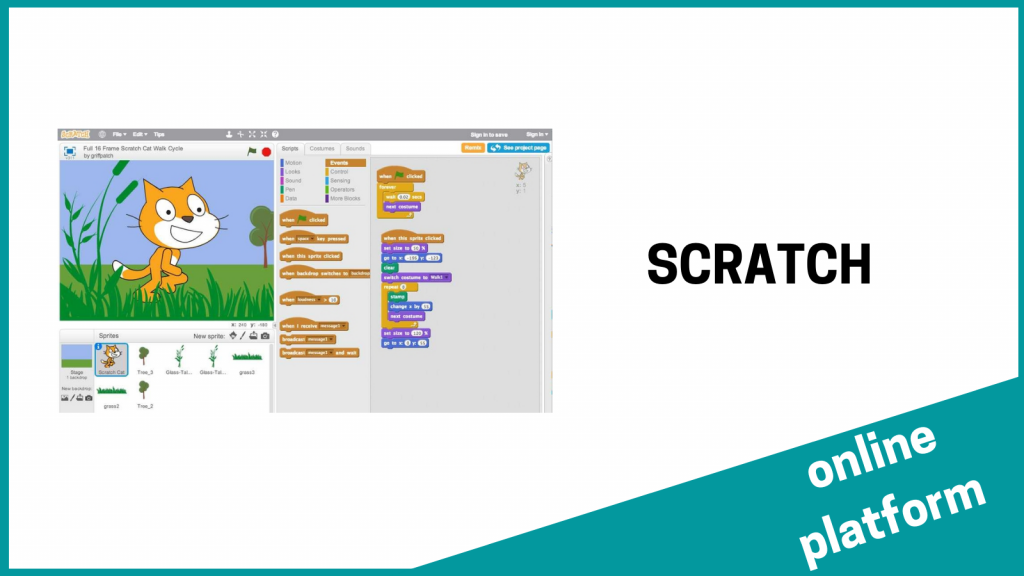

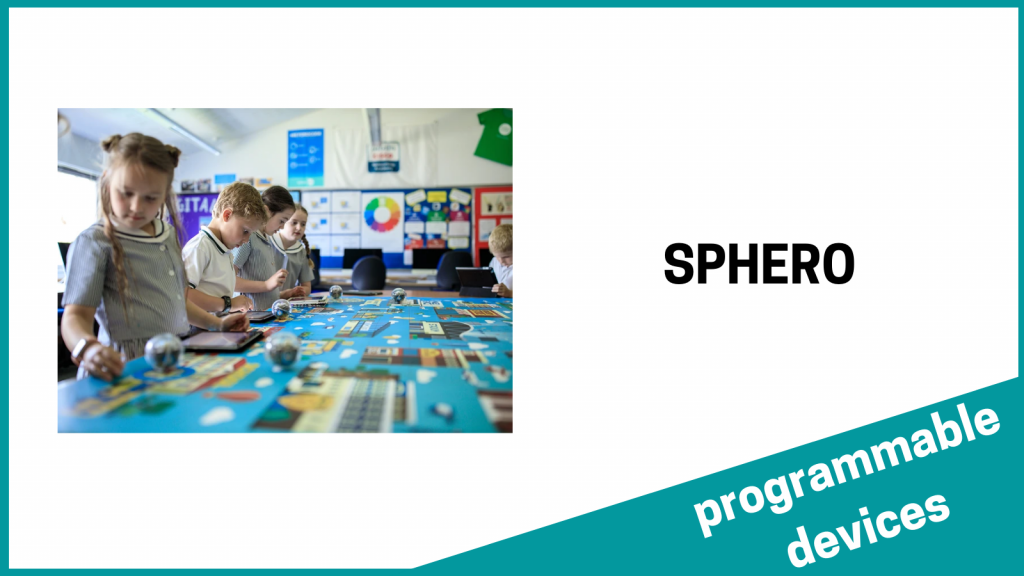




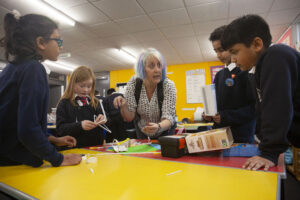
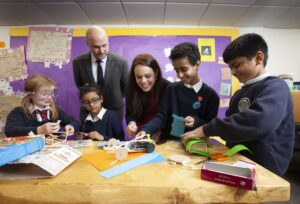 If this approach is to succeed, he concedes, it will need support from the very top.
If this approach is to succeed, he concedes, it will need support from the very top.